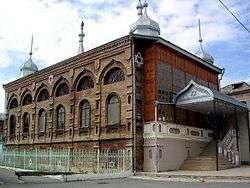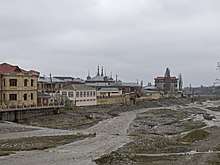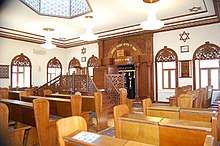Qırmızı Qəsəbə
Qırmızı Qəsəbə ([ɡɯɾmɯzɯ ɡæsæbæ], Russian: Красная Слобода, Krasnaya Sloboda, English: Red Town, also known in English as Gyrmyzy Gas(s)aba or Krasnaya Sloboda) is a village and municipality in Quba District of Azerbaijan. It has a population of 3,598, and is believed to be the world's only all-Jewish town outside Israel[2][3] and the United States.[4]
Qırmızı Qəsəbə | |
|---|---|
Municipality | |
 Six Dome Synagogue in Qırmızı Qəsəbə | |
 Seal | |
 Qırmızı Qəsəbə | |
| Coordinates: 41°22′25″N 48°30′38″E | |
| Country | |
| Rayon | Quba |
| Population (2010)[1] | |
| • Total | 3,557 |
| Time zone | UTC+4 (AZT) |
The village is located across the Qudiyalçay River (or Kudyal River) from the larger town of Quba. It is the primary settlement of Azerbaijan's population of highland, or Mountain Jews, who make up the population of approximately 4,000.[5] The most widely spoken language in Qırmızı Qəsəbə is Juhuri. Qırmızı Qəsəbə is considered to be the world's last surviving shtetl.[6][7]
The settlement is sometimes referred to as the "Red Town" or the "Red Village", possibly because of the red tiling used on many of the roofs.[8] Other sources attribute the name to the protected status the town received during the Soviet period, when it was shielded from persecution during World War II.[9]
Geography

Initially spread throughout the mountainous region, the Jewish population of the highlands became centered around Quba.[9]
Quba
Quba is one of the popular regions of Azerbaijan. In the past, the guests visiting Azerbaijan were invited to visit Quba because of its proximity to the capital city. Lezgins, Tats, Khinalug people, Budukh people, and Kryts people were living in peace and friendship with Turks in Quba for centuries. Qırmızı, being located in Quba, where the Mountain Jews reside, is also important in promoting Quba.[10][11]
Demographics
Officially, 213,138 Jewish people were registered in 34 settlements of the Caucasus in 1881. Over the past hundred years, along with highland Jews, other ethnolinguistic groups or the regions—Ashkenazi, Krymchaks, Kurdish Jews, and Georgian Jews—also lived in Azerbaijan. However, since the 19th century, the majority of Jewish population of republic is consisting of Mountain Jews.[12][13]
History

The first Jewish settlement in the area was named "Kulgat" on the left bank of the Gudjalchay, just a few kilometers from present day Qırmızı. The old grave stones in the Kulgat area and other evidence that had been partially destroyed during the attacks of the Nadir Shah in the early 18th century prove that the Jews had lived here.
While the highland Jews had been in the area around Quba since at least the 13th century, the formal creation of Krasnaya Sloboda is traced back to the 18th century. In 1742 the Khan of Quba, Fatali Khan, gave the Jews permission to set up a community free of persecution across the river from the city of Quba.[15] Originally referred to as Yevreiskaya Sloboda (Jewish Settlement), the name was changed to Krasnaya Sloboda (Red Settlement) under Soviet rule.
The Jews who moved here had previously lived in 9 disparate settlements. Jews from Gilan moved to the settlement in the 1780s. The Gilaki settlement of the Gilani Jews located in the center of the Red settlement. People coming from Baku and Quba lived in the settlement of Mizrahi ("East"). Migration from different locations influenced the diversity of employment. For example, Jews moving from mountainous regions were engaged in various agricultural fields, and people who immigrated from Iran were engaged in trade.
The massive settlement in the Red town began in 1731. After the death of Huseynali Khan in 1758, his son Fatali Khan was leader of Quba khanate. Fatali Khan, highly appreciating the loyalty, wisdom, and industriousness of the mountain Jews, gave them a great opportunity for engaging in agriculture, gardening, trade, and crafts. Favorable living conditions created for Jews in Quba caused the relocation of Jews from other villages, such as Qusar, Ucgun, Shudukh, Griz, and even from Baku, Iran, Turkey and other places to Quba.
Finally, mountain Jews who escaped attacks and persecutions joined the shelter of heading Husseinanli Khan in Quba. The Quba Khanate, in development during the rule of Hussein Khan (1722-1758) and his son Fatali Khan (1758-1789), consist of the northern lands of Azerbaijan and southern Dagestan, from Derbent to Lankaran. Since 1722, mountain Jews have settled in the territory of Gudyalchay.[10]
Among Russian Jews, the town once was known as "little Jerusalem".[16] Located at the intersection of East and West, more than 40 minorities and ethnic groups live in Azerbaijan, including Talyshs, Avars, Lezgins, Russians, Ukrainians, Georgians, Poles and others.[17]
The town has had an influx of financial support from relatives living in Israel and features the new Bet Knesset Synagogue.[18] However, after Azerbaijan's independence in 1991, many residents emigrated to Israel, the United States, and Europe, and the population dropped from the roughly 18,000 that lived there during the era of Communism.[19]
Religious practice
The Jewish residents continue their worship in the remaining synagogues. Only eight of the thirteen synagogues have been preserved in the settlement.
Two synagogues exist in Qırmızı Qəsəbə: "Altı günbəz" (Grand) synagogue which was built in 1888 and renovated in 2000,[20] and "Giləki" (Hilaki) synagogue which was built in 1896 and renovated recently.[14]
Residents speak in three languages: Judeo-Tat which mountain Jews speak in daily life, Russian and Azeri. One of the two schools here is taught in Azeri or Russian.[8]
Notable people
- Yevda Abramov (1948–2019) - politician, member of parliament in Azerbaijan
- Zarakh Iliev (born 1966) - billionaire property developer
- Yagutil Mishiev (born 1927) - publicist
- God Nisanov (born 1972) - billionaire property developer, Vice-President of World Jewish Congress[21]
- German Zakharyayev (born 1971) - businessman, Vice-President of Russian Jewish Congress[22]
References
Notes
- "Azerbaïdjan". populationdata.net.
- Gould, Kevin (July 14, 2011). "It's an all-Jewish town, but no, it's not in Israel". The Jewish Chronicle. Retrieved February 1, 2020.
- Barkat, Amiram (29 September 2006). "The Village People". Haaretz. Retrieved 1 April 2018.
Tucked away in the mountains of Azerbaijan is the world's only wholly Jewish town outside of Israel
- Joel, Kiryas (November 2, 2017). "Hasidic Jews in upstate New York". The Economist. Retrieved February 1, 2020.
- Minahan, James B. (2014). Ethnic Groups of North, East, and Central Asia: An Encyclopedia. ABC-CLIO. p. 124. ISBN 1610690184.
- "Eating with the Mountain Jews of Azerbaijan". Food52.com. 10 January 2017. Retrieved 12 April 2017.
- "Jewish shtetl in Azerbaijan survives amid Muslim majority". The Times of Israel. Retrieved 12 April 2017.
- "Azerbaijan's Jewish enclave".
- "Krasnaya Sloboda (Qırmızı QƏsƏbƏ)". AtlasObscura.com. Retrieved 25 March 2018.
- "Krasnaya Sloboda". azerb.com.
- "Quba". Brittanica.com.
- "Krasnaya Sloboda – unique settlement of Jews in Azerbaijan". azernews.az.
- "Azerbaijan Virtual Jewish History Tour". jewishvirtuallibrary.org.
- "Qırmızı qəsəbə "Giləki" sinaqoqu". scwra.gov.az. Retrieved 12 April 2017.
- "Jerusalem of the Caucasus". Visions of Azerbaijan Magazine. Retrieved 9 March 2017.
- "Jewish shtetl in Azerbaijan survives amid Muslim majority". The Times of Israel.
- "JEWS IN AZERBAIJAN: A HISTORY SPANNING THREE MILLENNIA".
- "It's an all-Jewish town, but no, it's not in Israel". www.thejc.com.
- "JOURNEY INTO THE UNREAL". www.shalom-magazine.com. SHALOM.
- "Qırmızı qəsəbə "Altı günbəz" sinaqoqu". scwra.gov.az. Retrieved 12 April 2017.
- "God Nisanov WJC Vice-President". World Jewish Congress. Retrieved 5 March 2017.
- "German Zakharyaev: "I overcome obstacles and sadness in life over praying to God"". Jewish Business News. 24 December 2015. Retrieved 29 April 2017.
Sources
- Qırmızı Qəsəbə at GEOnet Names Server
- Inga Saffron, "The Mountain Jews of Guba", The Philadelphia Inquirer. July 21, 1997, page 1. Accessed on May 1, 2006
- Tom Parfitt, "Life Drains Away from Lost Tribe of Mountain Jews", The Daily Telegraph, April 27, 2003, Accessed on October 21, 2014
- Amiram Barkat, "The village people", Haaretz September 29, 2006, Accessed on September 30, 2006
External links
![]()
.svg.png)